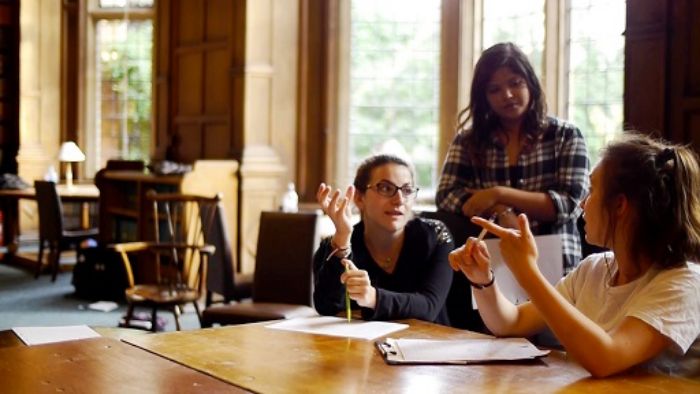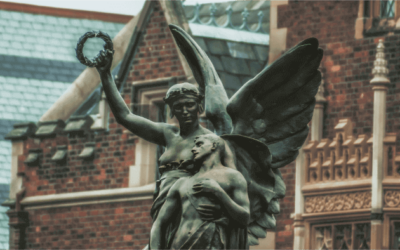Every year, dozens of Politics books flood onto the market, but only a select few stand the test of time. This list of the ten books every Politics student should read span from 375 BC to 2012 AD, covering everything from political treatises and ethical reflections to economic analyses of individual states.
Get a head start on these politics books now if you’re planning to study the subject at university! You’ll need to be able to demonstrate your interest in Politics in order to put together a successful application, so being able to chat about these titles in your personal statement could really help you to stand out! Plus, they’ll likely be required reading for any Politics-related undergraduate course. These essential reads also form part of the comprehensive curriculum at our Oxford summer schools, enriching your understanding before you even step into a university lecture hall.

1. Plato, The Republic (c. 375 BC)
Plato was an Athenian philosopher, and one of the first Western thinkers to marry philosophy and politics. The Republic discusses the meaning and nature of justice, arguing that a ‘just’ society depends on having a good relationship between three different groups: ‘producers’ (craftsmen, farmers), ‘auxiliaries’ (soldiers) and ‘guardians’ (rulers, politicians). He addresses ethical and political concerns by trying to answer the question: ‘why do men behave justly?’ He believed that, in order to be ‘just’, men must also be ‘good’.
2. Niccolo Machiavelli, The Prince (1532)
Machiavelli was an Italian politician living in Florence. The Prince marks an important break from previous trends in Western political thought, as it is based on real past experiences, rather than abstract ethical and political principles. Machiavelli aimed to reveal human nature and power structures for what they really are, by looking at the real results of men’s past actions. He controversially argues that murder and betrayal are acceptable if they lead to the attainment and retention of power. Highly unpopular with the Catholic Church, the book was dedicated to Lorenzo de Medici, the Florentine ruler, with the aim of helping him hold onto power.
3. Thomas Hobbes, Leviathan (1651)
Hobbes was an English philosopher and royalist. His Leviathan was written against a backdrop of English civil war, with parliament aiming to dethrone Charles I and establish a republic. Hobbes argues that the natural state in which humans live is anarchy, where the weakest are dominated by the strongest. He suggests that a ‘social contract’ between the people and their sovereign would remove the risk of total domination. Arguing against the divine right of kings, a long established belief that monarchs are selected by God, Hobbes instead proposes that royals hold power only because their subjects allow them to. He does not dispute the king’s absolute power, but rather suggests it is approved by the people.
4. John Locke, Second Treatise of Government (1689)
Locke wrote his Second Treatise of Government as a direct response to the political situation in England at the time. He defines political power morally; arguing that the state can and must make and enforce laws for the good of the public. Locke argues that although all people are equal in what he calls a ‘state of nature’, they must surrender some ‘natural’ freedoms upon entering society in order to be protected by common laws. Although very different to Hobbes, Locke also argues that the state only has power over the people so far as they are willing to accept it. Going further, he writes that sovereignty is firmly in the hands of the people, and they can choose to depose a state executive if it no longer works in their best interests.
5. Jean-Jacques Rousseau, The Social Contract (1762)
Rousseau was a French philosopher writing in the decades leading up to the French Revolution. In The Social Contract, he argues that laws are binding only when they are supported by the general will of the people, and that the people should only support those which ensure their freedom. He is critical of his contemporary states, writing that they repressed the physical and civil freedoms of the ‘common men’. Rousseau believed that legitimate political authority could only exist if it was born out of a social contract that all citizens had agreed to. His work was ground-breaking as it spoke of the ‘common man’ instead of elites. You might have already heard of this one, as the quote ‘Man is born free, but he is everywhere in chains’ is taken from The Social Contract.

6. Alexis de Tocqueville, Democracy in America (1835)
Tocqueville was a French sociologist and political theorist. He wrote Democracy in America after his trip to the United States, where he investigated the American prison system. The book is divided into two volumes, focusing on the structures of the American government and the institutions that helped maintain freedom in the country. Tocqueville believed that equality was the greatest political and social idea of his time, and saw America as the ideal realisation of an equal country. He applauds American individualism, but is wary of the dangers its extremity, known as atomism, could bring. He argues that some kind of social hierarchy is necessary for a productive relationship with the state.
These topics are also a key part of the political science curriculum in our Oxford summer course, offering students deep insights into democratic principles and governance.
7. Karl Marx and Friedrich Engels, The Communist Manifesto (1848)
Marx and Engels were German socialist philosophers, and their Communist Manifesto would became the political treatise for socialist and communist parties in Europe, but not until the Bolshevik Revolution of 1917. In this short work, they present a brief survey of history from feudalism to capitalism. They argue that capitalism must be overthrown by the workers, in an international ‘revolution of the proletariat’. Marx and Engels wanted workers to be elevated to the position of the ruling classes, and also advocated the abolition of private property.
8. John Stuart Mill, On Liberty (1859)
Mill, a British philosopher and economist, wrote On Liberty to justify the positive effects of freedom on individuals and on society as a whole. Mill believed that liberty enables social progress and avoids stagnation. On Liberty is also a defence of nonconformity; he believed that society encourages conformity, and that individual autonomy is opposite and preferable to this. He argues that society has a responsibility to develop individuals into rational, moral beings. Mill also points out that the success of individuals is directly linked to the success of the state.
9. Hannah Arendt, The Origins of Totalitarianism (1951)
Arendt was a German-Jewish intellectual who fled during the rise of the Nazis in 1933, first to France and then on to the United States. In this work, she aims to understand the origins, rather than the causes, of totalitarianism. Her analysis claims that societies after World War I were filled with resentment, and so prone to be manipulated by demagogues. Arendt believed that party politics and parliamentary government were going through a crisis of legitimacy, and the appeal of totalitarianism lay in its manipulation of the truth. Her account of the origins of totalitarianism concludes with a description of concentration and death camps in Europe, which she believed representative of totalitarian rule.
10. Daron Acemoglu and James A. Robinson, Why Nations Fail (2012)
M.I.T economist Acemoglu and Harvard political scientist Robinson teamed up to write Why Nations Fail. In this recent book, the two authors outline the key differences between ‘successful’ and ‘unsuccessful’ nations. They argue that nations succeed when they have ‘inclusive’ political and economic institutions that do not concentrate power and opportunity into the hands of a minority. Acemoglu and Robinson point out the links between economic and political success. To them, democracy is necessary for a successful economy, but this limits their political vision as it is difficult to export to states with different systems of government.
Next Steps for Aspiring Politics Students
- Fancy taking your politics study to the next level? Check out our Politics summer courses in Oxford.
- Interested in becoming a Politician? Read our blog on how to become a politician!




